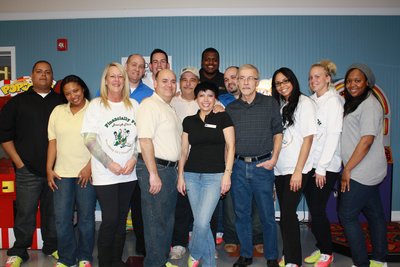Most New Jersey students have trouble balancing a checkbook, and even more trouble understanding the complexities of investment, consumption, and savings, according to a recent study conducted by Junior Achievement of New Jersey.
“Nearly half of the 1,000 U.S. teens surveyed say they are unsure about how to effectively invest their money,” said the results of the annual Junior Achievement/Allstate Foundation “Teens and Personal Finance” Survey.
Junior Achievement, a not-for-profit organization founded nearly a century ago to help better inform kids about how the economy works before they go out into the real world, decided they needed to do something about this.
“Our volunteers could be anyone that is positive.” – Catherine Milone
____________
Although Junior Achievement has had a presence in Hudson County for many years – especially in Jersey City, where it has been holding classes for students in various aspects of economics – the group is seeking to expand its efforts to all of the towns in the county.
Last year, they had classes in Hoboken High School, this year they are involved in Dickinson High School in Jersey City, as well as a number of elementary schools.
“We love working in Jersey City,” said Catherine Milone, president of Junior Achievement of N.J. “But we really want to reach out to all the communities in Hudson County.”
Milone said there are several programs that are offered to students on different levels.
In Jersey City, one of the key companies is Goldman Sachs, a financial firm that provides volunteers to come in to talk with students.
“We want them to become role models for the kids,” she said. “Our volunteers could be anyone that is positive. We train the volunteers with our materials.”
Lessons for early elementary school children often provide the most basic of information, centered around five activities, teaching kids about how money moves through the community, how people work to meet their needs, and spend money.
“In Newark, Trenton, and Camden, we even have high school students who are volunteers,” she said.
In Jersey City high schools such as Dickinson and Henry Snyder, as well as the elementary schools, volunteers tend to come from local corporations such as Goldman Sachs, PSE&G, Acapel Lucient, and Verizon. Capital One Bank, however, is one of the largest providers of volunteers, recruiting almost half of the group’s 500 volunteers, usually from people who work in their system or back offices.
This is a reality-based hands-on learning lab, where students learn to understand budgeting and other issues. These are 12 lessons taught during regular school hours for 4 to 12 weeks on personal financial planning and principles of budget.
While the students involved with the program at Dickinson this year are mostly 12th graders, the program is also open to seventh and eighth graders on this level.
Verizon donates space for a nine-week program in its Newark offices, where 60 to 100 students from schools like Dickinson come in from the learning lab to get even more hands-on experience, working on models that will teach them about budgeting.
Students in groups of five, along with an adult mentor, were given the financial profile and were asked to make decisions about money finances based on income and household expenses.
“We have very active board members. They walk the talk, and a lot spend quality time with students,” Milone said.
To help fund these programs, and cover the costs of materials and insurance for its volunteers, Junior Achievement held a bowl-a-thon kick off in April, which is National Financial Literacy Month.
But people can always donate, and schools can get more information about the program by calling (609) 419-0404.
“We raise money through the bowl-a-thon, and this year we raised about $43,000,” she said.
Almost a century old program
Junior Achievement was started in 1919 by Horace Moses. Moses was a businessman, an industrialist who owned a paper company in Springfield, Mass. He found he was constantly retraining employees on skills he felt they should already know. Moses was also inspired by the 4-H Club in his region – a hands-on learning experience for kids to learn about farm life from those who lived on farms. He wanted to start a similar program where city kids could learn the essentials of business from those who worked in offices and factories throughout the city. He started Junior Achievement as an after-school program where kids would meet at a local site and actually start a company from scratch.
Through the years, Junior Achievement has made several changes, and today is the largest economic education program in the United States. Programs reach students from kindergarten through twelfth grade during school hours. Volunteers from the local community serve as role models and visit a classroom five to eight times to present the Junior Achievement programs. Junior Achievement provides a comprehensive training on curriculum for all new volunteers.
Junior Achievement has been in existence in N.J. since 1953, when the program opened its first office in Newark. Junior Achievement opened satellite offices in Elizabeth in 1957, Camden in 1965, and Princeton in 1985. In February 2001, four Junior Achievement operations across the State of New Jersey merged to become one statewide operation.
“We hope to inspire the young people that we reach to be more responsible with their money so they can take care of themselves, their families, and their communities,” said Catherine Milone.
Al Sullivan may be reached at asullivan@hudsonreporter.com.
